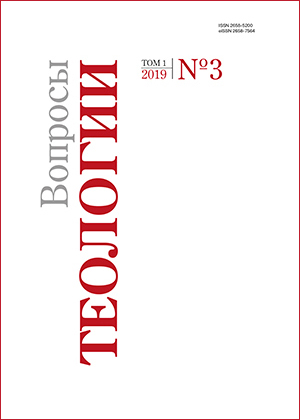Epistemic origins of neo-scholastic interpretation of ontological proof of divine existence and discussions concerning ontologism
DOI:
https://doi.org/10.21638/spbu28.2019.303Abstract
The article discusses the problem of the foundation of the development and evaluation of ontological (aprioristic) proof of Divine existence in some traditions in the philosophy of the 19th century such as Ontologism and Neo-Scholasticism. The history of the development of this argument in the tradition of the Middle Ages and Early Modern period illustrates that at its foundation is the belief in the possibility of direct (obvious, evidential) apprehension of certain metaphysical principles that relate to the Divine existence, and their formal (aprioristic) demonstration. Thus, the difference in meaning of the possibility of explicating these principles (and recognition or non-recognition of this epistemological possibility) founded differences in evaluation of ontological proof. It has been shown that scholasticism, in the end, rejected this opportunity and was highly critical and negatively interpretated this kind of proof, while some modern thinkers have recognized this opportunity and included this proof in their philosophical theology (Descartes, Leibniz and other). We analyzed the teaching of A. Rosmini, V. Gioberti, and С. Ubags, that returned to the ontological proof, based on the Modern European philosophy, and they considered ontological proof as the basis of all philosophical and theological thinking. The Neo-Scholastic and Neo-Thomism traditions were then studied: Th.-М. Zigliara, J. Kleitgen, G. Sanseverino, and J. Franzelin who argued against the ontological proof and proposed epistemic arguments related to the non-evidentialistic interpretation of knowledge and the disclosure of internal mediating mechanisms of cognitive activity. In conclusion, despite the predominantly metaphysical and theological basis of the discussion, it took place within the framework of the discussion of epistemic models, and this is important for the history of the theory of knowledge and history of the formation of Neo-Thomism, which (through F. Brentano, a witness of these discussions) is associated with several schools of contemporary philosophy.
Keywords:
Neo-Scholasticism, Neo-Thomism, Ontologism, epistemology, proof of the Divine existence, knowledge, thinking, до- казательства бытия Божия, познание, мышление
Downloads
References
Downloads
Published
Issue
Section
License
Articles of "Issues of Theology" are open access distributed under the terms of the License Agreement with Saint Petersburg State University, which permits to the authors unrestricted distribution and self-archiving free of charge.




